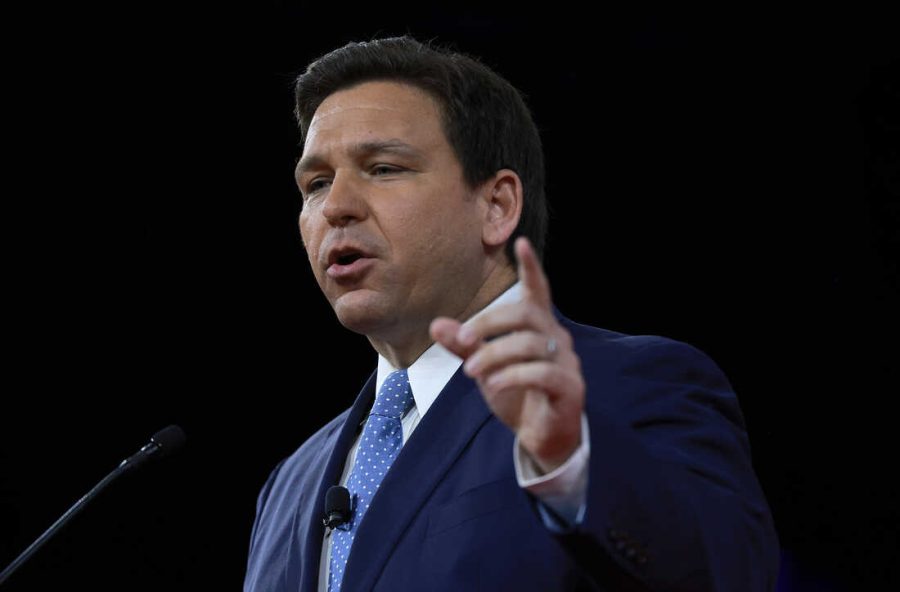Florida Rejects Critical Race Theory
ORLANDO, FLORIDA – FEBRUARY 24: Florida Gov. Ron DeSantis speaks at the Conservative Political Action Conference (CPAC) at The Rosen Shingle Creek on February 24, 2022 in Orlando, Florida. CPAC, which began in 1974, is an annual political conference attended by conservative activists and elected officials. (Photo by Joe Raedle/Getty Images)
April 21, 2022
This past Thursday, April 14, 2022, Florida’s State Board of Education banned 54 out of 132 mathematics textbooks from the upcoming school year’s curriculum over concerns of critical race theory’s ability to “distort historical events.” This list of rejected textbooks shockingly comprises approximately 41% of submissions, making it the most in the history of Florida.
In a statement made by Florida Gov. Ron DeSantis during a press conference on Monday, “Math is about getting the right answer…It’s not about how you feel about the problem or to introduce some of these other things. It’s there’s a right answer and a wrong answer.”
In addition to citing critical race theory, other reasons for banning these books include “inclusions of Common Core, and the unsolicited addition of Social Emotional Learning (SEL) in mathematics,” as stated in a news release.
In recent years, critical race theory—which states that the social institutions in the U.S. are built upon racism—has become increasingly politicized, with its opponents claiming that the study has Marxist roots and thus stands in staunch opposition to America’s ideologies. However, is this really true? According to several scholars who study it, critical race theory is crucial in fully understanding the deep historical roots of racism and inequality in America and its relevance in society today.
It can even be argued that in this case, “objectivity” is synonymous with compliance for a failure to acknowledge the truths of our past as well as their impact today leans more towards condemning racism under the guise of maintaining “factuality.”
Similarly, standards for teaching Social Emotional Learning, or SEL, have been adopted by over a dozen states, but even as more states consider teaching it, conservative groups—such as those in Florida—lobby against it by stating that critical race theory is embedded into the lessons.
By claiming that critical race theory is present everywhere, it is necessary to stop and think why that is so. If it is everywhere, then that must definitely be for a reason—that several things require you to look at them from a critical, acknowledging lens. The very fact that Florida’s lawmakers have to ban these books and SEL topics simply goes to show how deeply inequality is engraved into our society.
According to the free expression group PEN America, there have been many laws with objectives to suppress teachings of racism and sexism, and with more than 100 bills being passed have been proposed with the same intentions. New laws and bills being implemented pertaining to those topics, raises concerns for society about whether the main purposes of education are being influenced more by politics rather than teaching.
Once the teaching of critical race theory was banned in Florida, DeSantis had claimed his reasoning as allowing students to believe that “the country is rotten and that our institutions are illegitimate.” In fact, when around 71% of books had not “appropriately aligned” with Florida’s guidelines over standardized topics, this had led to the highest number of books being banned in the K-5 grade levels.
Florida’s new laws seem to align well with Republicans and their efforts to counteract the so-called “liberal cultural values.” In addition to all the attention Florida and their lawmakers have received for these newly imposed laws, a press release covering the banning of these textbooks had been titled, “Florida Rejects Publishers’ Attempts to Indoctrinate Students.”
Along with those who are fully behind these laws, there are also the few who are quite opposed to Florida’s actions. A Florida State Rep. Anna Eskamani, believes that this is just part of the Republican’s elaborate agenda to dispose of critical thinking in the education system. Eskamani, clearly confused with their reasoning, considers how “they’re the ones indoctrinating students by attempting to censor mathematic textbooks.”
With all this evidence, Eskamani wonders “if these math books highlighted statistics of racial disparities & that’s what they don’t like?” The State Rep. stands behind advocating for change instead of just censoring vital teachings to children, just for personal beliefs and politics.
Florida has been catching the attention of citizens across the country, all considering whether to follow or disregard the new bills and laws. The important question is are politics held to a higher standard rather than the education and teachings for students enrolled in school?


